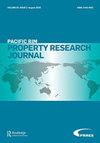Valuers’ receptiveness to the application of artificial intelligence in property valuation
IF 0.3
Q3 Economics, Econometrics and Finance
引用次数: 16
Abstract
Abstract Studies have shown that the level of valuation inaccuracy in Nigeria is higher than the acceptable international standard. This may be linked to the preference for traditional valuation approaches. This study investigates the readiness of Nigerian valuers to adopt the artificial intelligence (AI) property valuation techniques that have proven to be reliable and accurate in property valuation. A cross-sectional study was conducted via a web-based questionnaire survey to registered estate surveyors and valuers practicing in Nigeria. The collected data were analyzed and presented with descriptive statistics in percentiles and mean score, in addition to the chi-square analysis. The results show that more than half of the respondents are aware of the AI valuation techniques. However, the techniques are not used in practice. The low adoption of the AI techniques is attributed to professional bodies responsible for regulation of real estate practice and tertiary educational institutions in Nigeria, who were not proactive enough to promote their know-how and application. It was found that active collaboration between local professional bodies and similar international organizations on member training and development may improve the usage of the AI techniques. The study highlights the need for a paradigm shift in the Nigerian property valuation practice.估价师接受人工智能在房地产估价中的应用
研究表明,尼日利亚的估值不准确程度高于可接受的国际标准。这可能与偏爱传统估值方法有关。本研究调查了尼日利亚估价师采用人工智能(AI)房地产估值技术的准备情况,这些技术在房地产估值中已被证明是可靠和准确的。通过基于网络的问卷调查,对在尼日利亚执业的注册房地产测量师和估价师进行了横断面研究。对收集到的数据进行分析,并采用百分位数和平均分的描述性统计,以及卡方分析。结果显示,超过一半的受访者知道人工智能评估技术。然而,这些技术并没有在实践中使用。人工智能技术的低采用率归因于负责监管尼日利亚房地产实践和高等教育机构的专业机构,他们在推广其专业知识和应用方面不够积极主动。研究发现,本地专业团体与类似的国际组织在成员培训和发展方面积极合作,可能会改善人工智能技术的使用。该研究强调了尼日利亚房地产估值实践模式转变的必要性。
本文章由计算机程序翻译,如有差异,请以英文原文为准。
求助全文
约1分钟内获得全文
求助全文

 求助内容:
求助内容: 应助结果提醒方式:
应助结果提醒方式:


